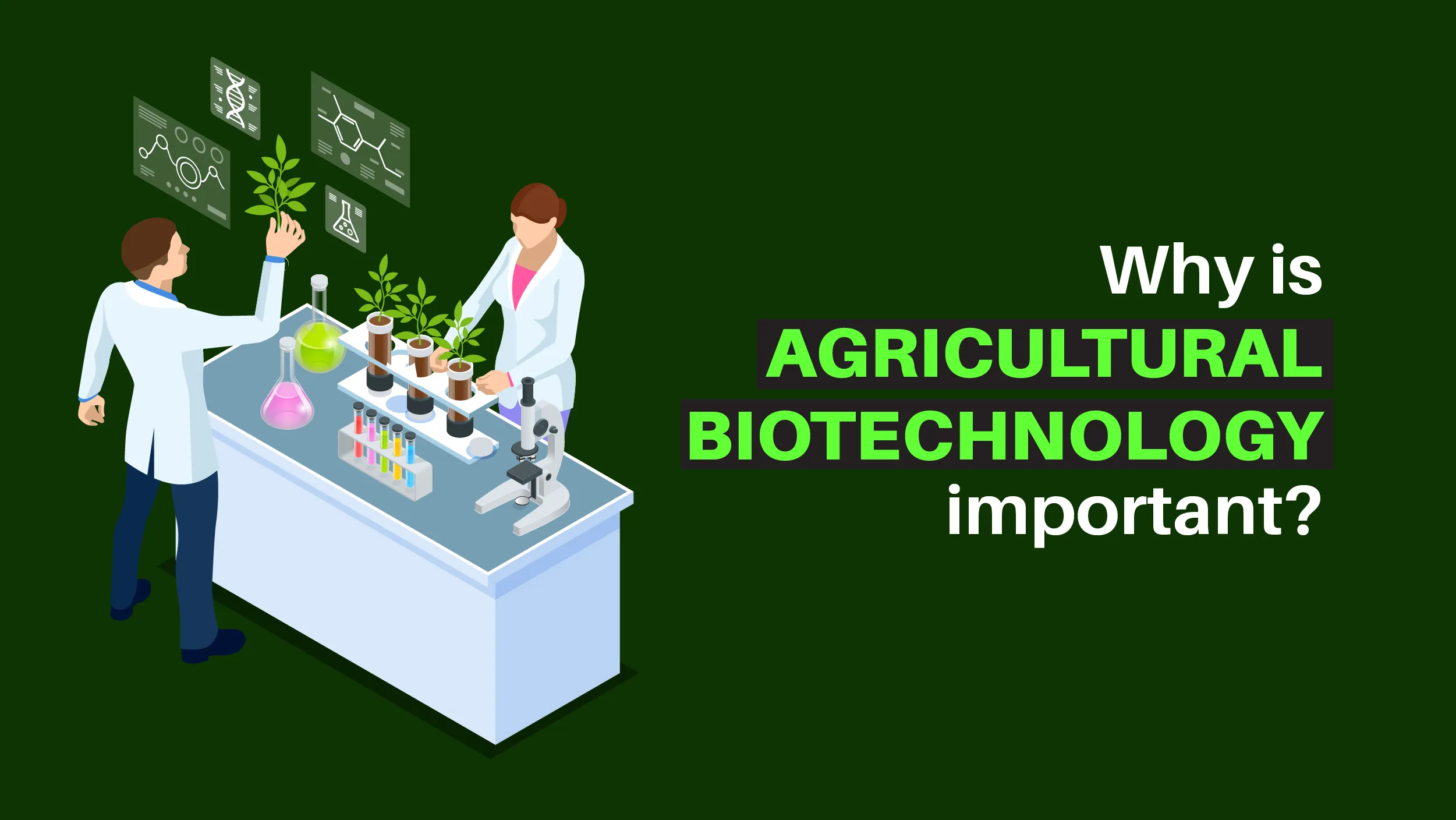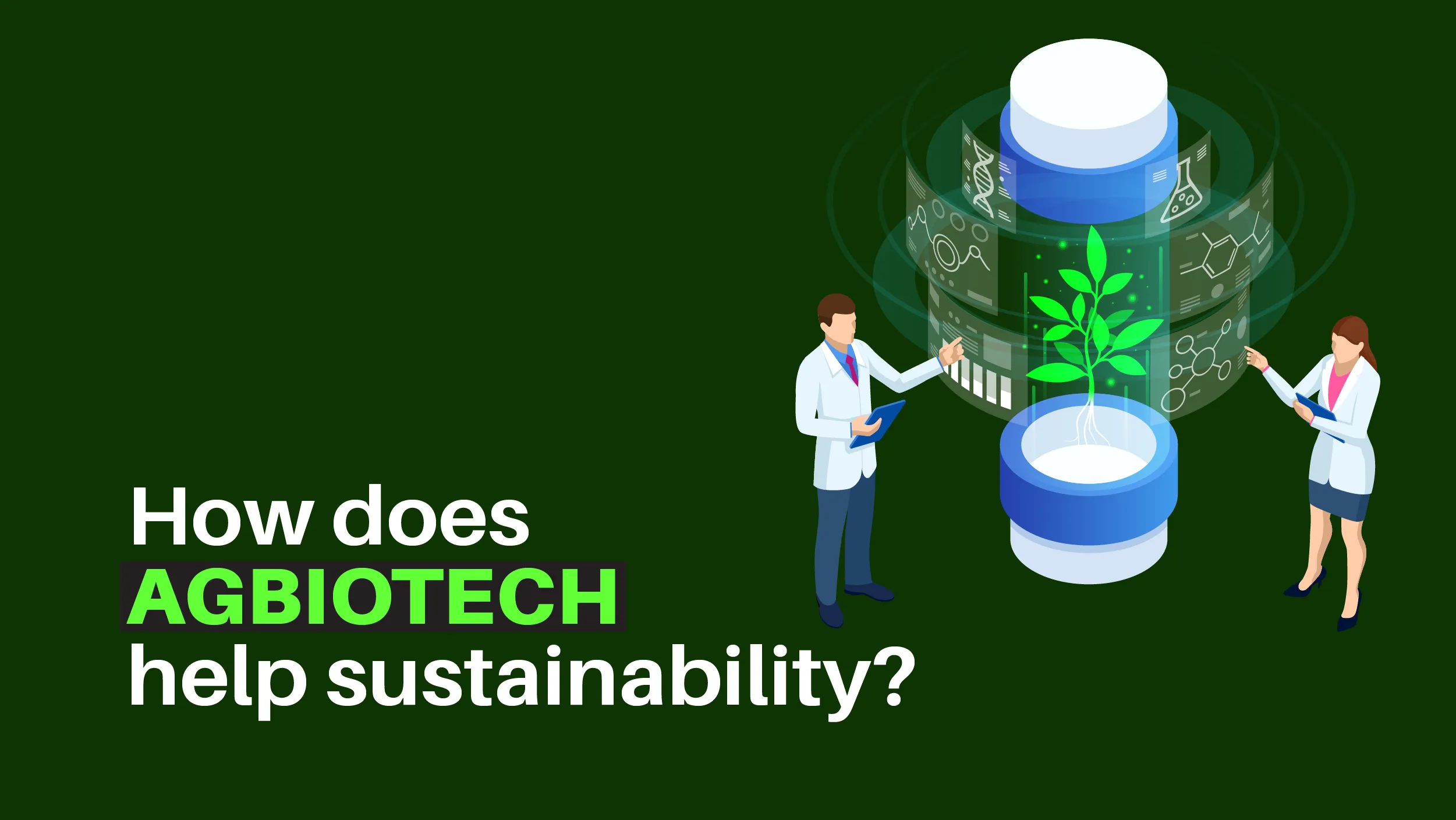What is agricultural biotechnology?
“Agricultural biotechnology” describes a variety of scientific instruments and methods used to alter living things, such as microbes, plants, and animals, for use in agriculture.
This field includes a variety of techniques, including tissue culture, genetic engineering, and molecular markers, that are intended to increase agricultural yields, strengthen resistance to pests and diseases, and improve nutritional content.
Why is agricultural biotechnology important?

Agricultural biotechnology is important for several reasons, primarily related to enhancing food security, improving agricultural sustainability, and addressing environmental challenges.
- Food Security: With the global population projected to reach 7 billion by 2050, agricultural biotechnology plays a crucial role in increasing food production.By developing genetically modified crops that are more resilient to pests, diseases, and climate change, biotechnology helps ensure a stable food supply.For instance, crops engineered for drought resistance can thrive in arid conditions, thereby reducing the risk of crop failure and food shortages.
- Sustainability: Agricultural biotechnology contributes to more sustainable farming practices. By creating crops that require fewer chemical inputs, such as pesticides and fertilizers, biotechnology reduces the environmental impact of agriculture.This not only helps protect biodiversity but also conserves natural resources like water and soil. For example, genetically engineered crops that are resistant to pests can lead to a significant decrease in pesticide use, promoting a healthier ecosystem.
- Nutritional Improvement: Biotechnology also enables the enhancement of the nutritional content of staple foods.Projects like BioCassava Plus aim to increase the vitamin content of cassava, a major food source in many developing countries, thereby addressing malnutrition and improving public health.
- Economic Benefits: By increasing crop yields and reducing losses due to pests and diseases, agricultural biotechnology can enhance the economic viability of farming.Farmers can achieve higher productivity with lower input costs, leading to increased profitability and economic stability in rural communities.
What are the challenges of AgBiotech?
- Regulatory Landscape: Agricultural biotechnology faces significant challenges due to the varying regulatory environments across countries. Long approval processes and stringent regulations in many regions can delay the adoption of biotech crops, making it difficult for farmers to access new technologies.
- Public Perception and Acceptance: The public’s perception of genetically modified organisms (GMOs) presents another challenge. Misinformation and safety concerns can lead to resistance from consumers and advocacy groups, affecting market demand and potentially influencing policymakers to be cautious about supporting biotechnology.
- Challenges in Developing Countries: In developing regions, limited infrastructure and funding for research and development are major hurdles. Many areas lack the resources and expertise needed to effectively implement agricultural biotechnology, which can prevent farmers from benefiting from these advancements. Additionally, there is often a disconnect between the traits farmers need and those being developed, leading to mismatched priorities.
- Environmental Concerns: There are ongoing debates about the long-term environmental impacts of biotech crops on biodiversity and ecosystems. While biotechnology can improve crop resilience and productivity, it is important to consider its potential effects on natural habitats and non-target species.
Also Read: What Is Agricultural Robotics and How Does It Impact the Future?
How does AgBiotech help sustainability?

AgBiotech significantly contributes to sustainability by reducing the need for chemical inputs, enhancing soil health, and addressing climate change. Biotech crops are engineered to resist pests and diseases, which decreases reliance on chemical treatments, thus lowering environmental impact and promoting healthier ecosystems.
Additionally, certain biotech crops require less tillage, helping maintain soil structure and reduce erosion. By developing varieties that can withstand extreme weather conditions, such as droughts and floods, agricultural biotechnology ensures food security while minimizing agriculture’s environmental footprint.
Furthermore, the adoption of biotech crops has been linked to significant reductions in greenhouse gas emissions, as decreased pesticide use translates to lower fossil fuel consumption. Overall, biotechnology enhances resource efficiency, allowing farmers to produce more food with fewer resources, which is essential for sustainably feeding a growing global population.
Is AgBiotech helping to increase crop resilience?
Agricultural biotechnology plays a crucial role in enhancing crop resilience by enabling the development of crops that are better equipped to handle the impacts of climate change, such as drought, flooding, and unpredictable weather patterns. Through biotechnology, crops are engineered to endure these abiotic stresses, allowing farmers to sustain productivity even in challenging environmental conditions.
Advanced techniques, such as CRISPR and gene editing, are being employed to create high-yielding and climate-resilient crop varieties. These innovations improve the crops’ ability to withstand both biotic stresses, like pests and diseases, and abiotic stresses, including temperature fluctuations and water scarcity.
By accelerating breeding programs, these technologies result in crops that not only produce higher yields but also thrive under adverse conditions. This contributes significantly to food security and promotes sustainable agricultural practices.
Conclusively
AgBiotech stands at the forefront of addressing global food security challenges by offering innovative solutions to enhance crop resilience, productivity, and sustainability. As detailed, biotechnology harnesses advanced techniques such as genetic engineering and CRISPR to develop crops that can withstand environmental stresses and adapt to changing conditions.
Despite the promising benefits, the field faces hurdles such as regulatory complexity, public skepticism, and infrastructural limitations, particularly in developing regions. However, by overcoming these obstacles and ensuring transparent, evidence-based communication, agricultural biotechnology has the potential to significantly advance sustainable agriculture and secure food resources for future generations.






